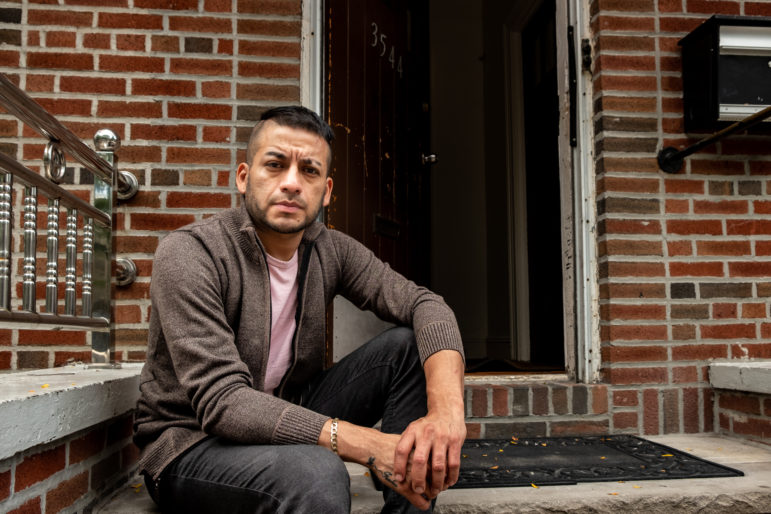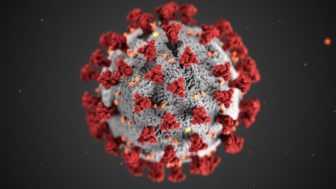LGBTQ Latino people are suffering a disproportionate economic impact because, as in all crises, the most marginalized people are often the ones who are most affected.

Adi Talwar
Anthony Sanabria, an assistant bartender, has been out of work since March 15. Since March, 13 customers of the bar where Sanabria used to work have died because of COVID-19.This article originally appeared in Spanish.
Translated by Daniel Parra
It’s a fact: the pandemic has hit Latinos disproportionately, and it seems to be even harder for LGBTQ Latinos—though it is hard to say for sure because the monthly employment and unemployment reports published by the U.S. Bureau of Labor Statistics do not include information on sexual orientation and gender identity.
Advocacy groups and academics have been calling for the inclusion of LGBTQ people in government data collection since before the pandemic. “It is important to include this information so that we can disaggregate the impact,” says Daniel Reyes, Chief Program Officer at the New York City Lesbian, Gay, Bisexual and Transgender Community Center, better known as The Center.
The differentiated impact has been noticed and analyzed by independent studies and surveys from organizations working to defend the equal rights for LGBTQ people. For example, the most recent Human Rights Campaign survey shows that “40 percent of Latinx LGBTQ respondents had their work hours reduced due to COVID-19, compared to 32 percent of Latinx respondents, 27 percent of LGBTQ respondents and 21 percent of the general sample population.”
According to Ty Cobb, Senior Director of Strategic Initiatives and Research at Human Rights Campaign, the reasons why LGBTQ Latinx people are suffering a disproportionate economic impact is because, as in all crises, the most marginalized people are often the most impacted. “We know that LGBTQ Latinx people, along with many other LGBTQ people of color, have historically lacked access to power and are fighting years of systemic inequality in our institutions,” Cobb says in a statement to City Limits.
In addition, it is well-known that LGBTQ people in general largely work in industries significantly impacted by the pandemic, “like restaurants or retail, so it is no surprise to see that those who are multiply marginalized have lost their jobs or lost work hours at greater rates,” adds Cobb.
In New York State, 5.1 percent of the population identifies itself as LGBTQ and 20 percent of them are Latinos, according to The Williams Institute at UCLA School of Law.
According to Reyes, a large portion of LGBTQ Latinx work in the leisure and hospitality industries which also includes the foodservice, hotel, and restaurant sectors. “I have friends who used to work in hotels who are still unemployed,” Reyes said by phone.
Unemployed and harassed
Anthony Sanabria is gay and lost his job as an assistant bartender on March 15. Since then, he has not been able to find a steady job. Since March, 13 customers that Sanabria used to see at the bar have died because of COVID-19.
His best friend, a 14-year-old trans woman, also died from COVID-19. “She was like a mom, like a sister and a friend,” Sanabria says on the phone. “I was called at seven in the morning. I was shocked. I fell down. Then I was told that I fainted.”
March also saw the death of Lorena Borjas, the trans activist, for many the leader of the trans-Latinx community in New York. “For a month I fell into a deep depression. I looked like a crazy person. I didn’t eat much. I cried a lot and kept thinking about what I was going to do without the support of anyone. I removed myself from social media. I didn’t want to hear from anyone,” Sanabria says between pauses in a weak voice.
Four of Sanabria’s friends have died and several other straight men he knew. According to HRC, LGBTQ Latinos surveyed not only reported higher unemployment rates, but also “a higher risk of encountering many of the economic setbacks already experienced by the greater LGBTQ population at large, including unemployment, reduced hours and difficulty paying bills,” the report states.
Sanabria, for example, had money to pay his room’s rent until May. Since then, he has been unable to pay his rent and since April, his landlord has harassed him in many ways.
“My landlord has asked me to leave the room four times, all by text messages. When it comes to asking for the rent, she doesn’t like to face me,” says Sanabria. On one occasion when the landlord tried to evict Sanabria, he called the police and the officers explained to his landlord that she could not evict him. Two days later, she removed the stove and the two roommates became upset with Sanabria.
Bianey Garcia-D la O, a political activist and trans rights organizer, says, “It’s not only about the lack of food and money but harassment from the landlords. They cut off electricity, they locked you out by changing your door lock, and people have to put up with the harassment.”
Among the LGBTQ community, the situation of trans women is the most difficult because it is much rarer to find a job that accepts them. “I know that many have fallen back on using drugs or alcohol to forget. In my case, I had stopped smoking cigarettes. I quit smoking years ago, but due to stress I went back to smoking cigarettes and marijuana,” says Garcia-D la O.
García-D la O says some landlords have installed cameras in corridors, in the kitchens, at the entrance of their homes to monitor who is quarantined. “That started because of the coronavirus,” says García-D la O.
Frustrations and fellowship
Since July, when Sanabria first called the police, the landlord has been more vigilant in using the cameras that were already installed before the pandemic. She constantly asks him about the visitors that he receives and she asks what they do during visits.
“My friends stop by and bring me food or they come to accompany me,” Sanabria says.
She has also turned off the hot water, removed the dishwasher, and thrown away some of Sanabria’s belongings, he sys.
In August the landlord told him that she was going to put the house up for sale and a few days later one of the two roommates left. Two weeks later, she told Sanabria that the house had been sold. Realtors have been visiting the house ever since. The “For Sale” sign is still on the front door.
“I had to call the police a second time because she tried to kick out my visitors,” says Sanabria. “The police came and talked to her again. She can’t kick me out.”
When tenants are evicted, “what we’ve seen at The Center is that young and old [LGBTQ] people return to the biological family. They go to unaffirming homes,” says Reyes.
Looking at the bright side, both García-D la O and Sanabria, highlight that in the midst of the crisis and despite the lack of money and food, they have found deeper fellowship.
“Bonds of friendship have been created. Many people in the LGBTQ community had never taken up food or money collections before, and all of this was born during the pandemic,” says García-D la O.










One thought on “COVID-19 Hit Especially Harsh for LGBTQ Latinos”
I could not refrаin frօm ϲommenting. Perfeсtly written!